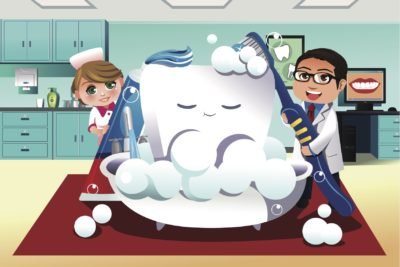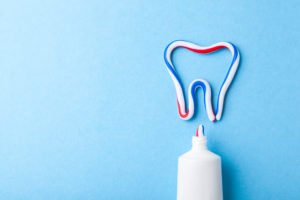Your baby will probably get his/her first tooth around 6 months. There’s a wide range of normal, though. Some babies are born with teeth (i.e. “natal teeth,” ouch!), while others remain toothless until a year or so.
Even if your baby doesn’t have teeth yet, it’s never too early to start learning about (and practicing) good infant dental hygiene. Here are the Top 5 Tips for Keeping Your Baby’s Teeth Healthy:
1. Visit the Pediatric Dentist by Age 1.
Back in the day, the first dental appointment wasn’t until age 3. Now, doctors recommend that babies establish care with a pediatric dentist by their 1st birthday (ideally when their first tooth erupts).1

2. Avoid Putting Your Baby’s Pacifier in YOUR Mouth to Clean It.
Yup, this is a thing.
Why is This a No-No? Because plaque is made up of bacteria that can be passed from person to person. Cavities and tooth decay are therefore contagious. Say “no” to sharing utensils and toothbrushes down the road, as well.
3. Don’t Forget to Brush.
Dentists recommend that parents start taking care of their babies’ oral health before their teeth even erupt. Ideally, parents should wipe their babies’ gums after every feed. To be honest, though, most sleep-deprived parents have trouble remembering (or finding the time) to do this. Therefore, try, at the very least, to wipe your baby’s gums after the last feeding of the night to decrease his/her risk of future “dental caries” (cavities). When your baby gets his/her first tooth, you can start brushing it with a baby toothbrush and a tiny bit of fluoride toothpaste.
4. Remember, Fluoride Is Your Friend.

Fluoride is a mineral that helps prevent cavities. The American Dental Association recommends that parents brush their babies’ teeth (once they appear) with a fluoride toothpaste twice a day.
Too Much of a Good Thing? Too much fluoride can lead to something called “fluorosis” (white stains on the teeth), so you don’t want to overdo it.
So, How Much Fluoride Toothpaste SHOULD I Put On My Child’s Toothbrush?
Here are the General Guidelines, Broken Down by Age:
- For 0-3 Year-Olds: A “smear” of fluoride toothpaste (the size of a grain of rice).
- For 3-6 Year-Olds: A pea-sized amount of fluoride toothpaste.
- For 6+ Years: An adult-sized amount of fluoride toothpaste (no more than a one-inch strip).
If your baby swallows a little toothpaste (which he/she probably will), don’t worry. It shouldn’t be a problem as long as you put the right(ish) amount of toothpaste on the brush to start.
5. If You’re Formula Feeding, Go for Filtered Tap Water Instead of Bottled Water.
While we tend to love our bottled water in the U.S., filtered tap water is actually the best choice for babies because it contains regulated amounts of fluoride. Bottled water, on the other hand, doesn’t naturally contain fluoride. Even if you see bottled water with added fluoride, it’s still better (and cheaper) to use filtered water to make the formula.
Friendly Reminder: Plain water should not be given to babies under 6 months of age.
Should I Boil the Tap Water (or Bottled Water) Before I Make the Formula? If you Google this question, you’ll find a ton of conflicting info on this subject. The American Academy of Pediatrics (the AAP) says it isn’t necessary to boil the water first unless there’s a concern about the quality of the water that you’re using (i.e. if you’re using well water or you live in a place with iffy tap water).2 However, other organizations, including the World Health Organization (the WHO), encourage parents to boil the water before using it.
So, What Should I Do? To play it safe, ask your baby’s doctor what he/she recommends based on where you live and what type of water you’re using at home (tap water, bottled water, or well water). You can also call your local water company to ask about the quality of the water in your area.
PediaTip: If you’re giving your baby formula and you don’t want to bother thinking about the water that you’re adding, opt for “ready-to-feed” formula. It’s more expensive than powdered formula, but there’s no mixing required.
Common Question: Why Bother Protecting My Little One’s Baby Teeth if They’re Just Going to Fall Out?

Although baby teeth are “practice teeth” in some ways, they DO affect the health of future permanent teeth. Plus, it helps to teach kids good dental habits early on.
The Bottom Line
Babies start teething around 4 months of age, and typically get their first tooth around 6 months. The first tooth will be a bottom middle tooth. Cold teething toys are the best way to manage bothersome gums. Try to remember to wipe your baby’s gums after the last feed of the night before his/her first tooth erupts. When your baby gets his/her first tooth you can brush it with a small dab of fluoride toothpaste (the size of a grain of rice), twice a day.





